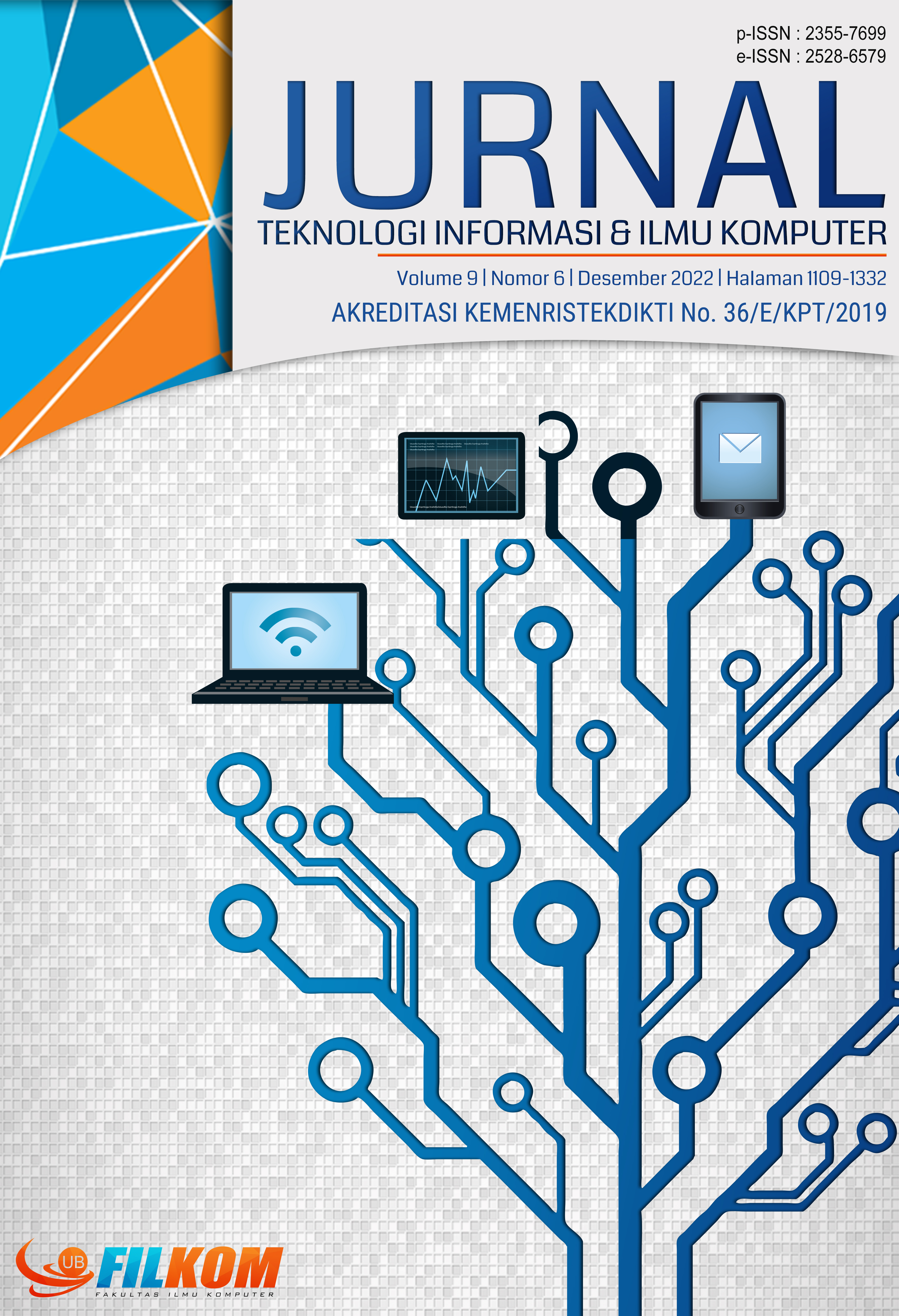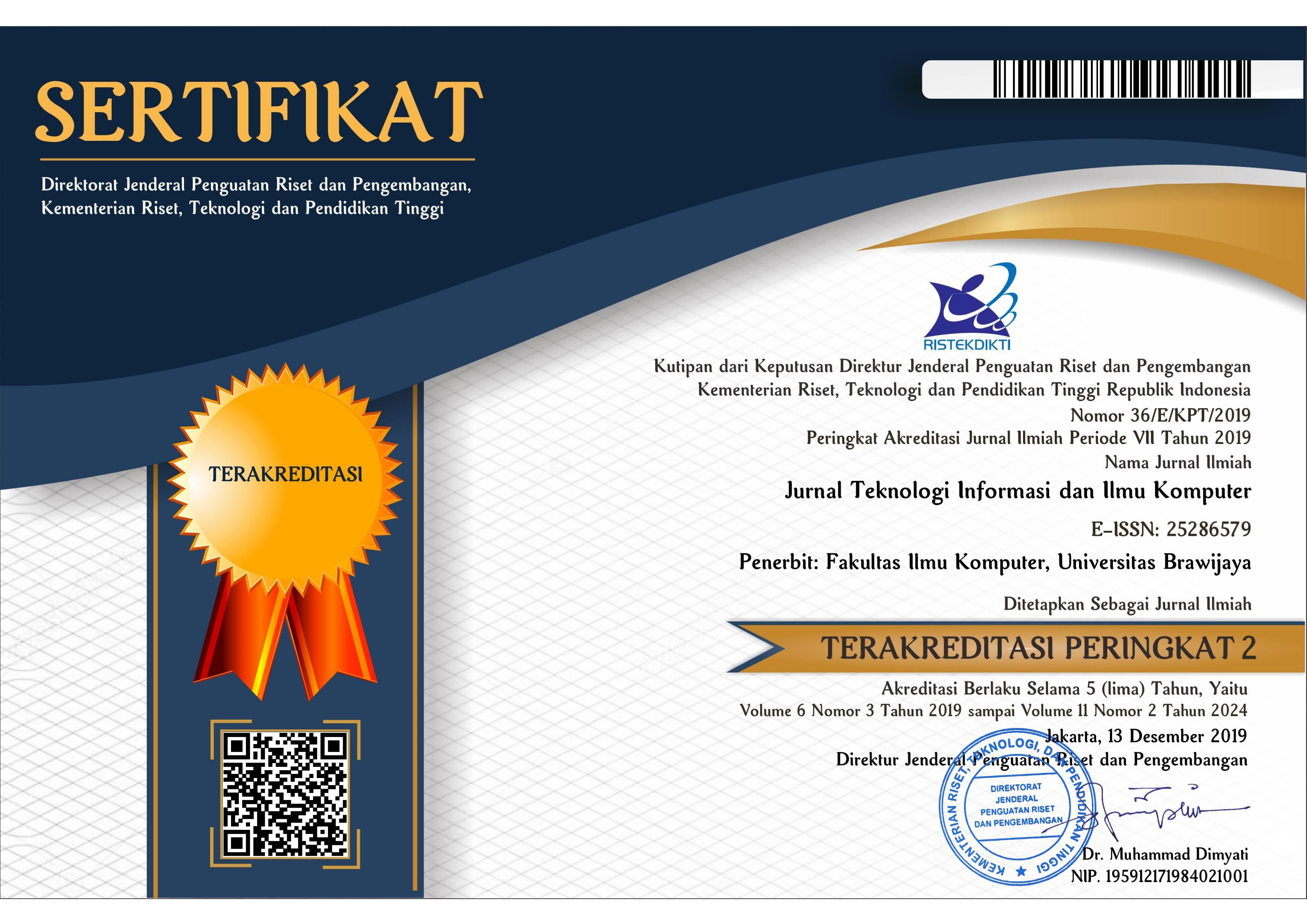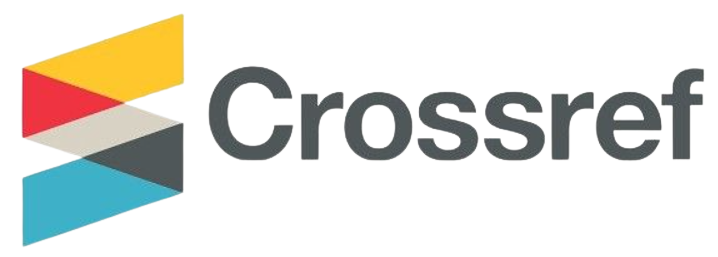Analisis Pengaruh Kualitas Layanan Terhadap Kepuasan Pelanggan dan Loyalitas Pengguna Aplikasi Jenius Menggunakan Model E-S- Qual dan E- Recs- QUal (Studi Kasus: Pengguna Aplikasi Jenius Kota Malang)
DOI:
https://doi.org/10.25126/jtiik.2022934937Abstrak
Jenius merupakan aplikasi yang telah dirancang oleh Bank BTPN guna memudahkan masyarakat ketika mengatur life finance menggunakan smartphone. Namun, aplikasi Jenius masih ditemui permasalahan terkait keluhan-keluhan terkait layanan yang diberikan terlihat pada ulasan aplikasi Jenius di Appstore dan customer service Jenius di social media twitter. Hal ini menjadi alasan dilakukannya penelitian untuk mengetahui aspek dari kualitas layanan yang mempengaruhi kepuasan dengan loyalitas pengguna aplikasi Jenius, khususnya di Kota Malang yang saat ini sedang berkembang di bidang digital finance. Pada penelitian ini memakai metode kuantitatif dengan menggunakan model Electronic Service Quality dan Electronic Recovery Service Quality, kedua model ini memiliki tingkat pengukuran yang baik berdasarkan penelitian sebelumnya yang dilakukan untuk mengukur kualitas layanan elektronik. Penelitian ini melibatkan sebanyak 100 sampel pengguna aplikasi Jenius di Kota Malang. Pada penelitian menggunakan purposive sampling sebagai teknik sampling, dan analisis regresi linier berganda dan sederhana sebagai teknik dalam analisis data. Hasil penelitian diperoleh jika dimensi efficiency, fulfilment, dan compensation memiliki pengaruh signifikan parsial (individu) terhadap kepuasan pengguna aplikasi Jenius. Lalu diperoleh hasil jika dimensi efficiency, system availability, fulfilment, privacy, responsiveness, compensation, dan contact memiliki pengaruh signifikan simultan (bersama-sama) terhadap kepuasan pengguna aplikasi Jenius. Dan didapatkan juga bahwa kepuasan pengguna berpengaruh terhadap loyalitas pengguna aplikasi Jenius.
Abstract
Jenius is an application that Bank BTPN has designed to make it easier for the public when managing life finance using a smartphone. However, the Jenius application still encounters problems related to the services provided, as seen in the Jenius application reviews on the Appstore and Jenius customer service on social media Twitter. The reason for conducting this research is to determine aspects of service quality that affect satisfaction with the loyalty of Jenius application users, especially in Malang City, which is currently developing in digital finance. This study uses quantitative methods using Electronic Service Quality and Electronic Recovery Service Quality models. Both of these models have a good level of measurement based on previous research conducted to measure the quality of electronic services. This study involved 100 samples of Jenius application users in Malang City. This research uses purposive sampling as a sampling technique and multiple and simple linear regression analysis as a technique in data analysis. The results obtained if the dimensions of efficiency, fulfillment, and compensation have a partial (individual) significant effect on the satisfaction of Jenius application users. Then the results are obtained if the dimensions of efficiency, system availability, fulfillment, privacy, responsiveness, compensation, and contact have a simultaneous (together) significant influence on the satisfaction of Jenius application users. Moreover, it is also found that user satisfaction affects the loyalty of Jenius application users.
Downloads
Referensi
ABUBAKAR, L. dan HANDAYANI, T., 2017. Perbankan Implikasinya Terhadap Pembaruan Hukum. 1(2).
ALAVI, M. dan MAJIDI, A., 2015. E-banking Service Quality Assessment Using ES-QUAL, E-RecS-QUAL Models (Empirical Evidence: Agribank). Iranian Journal of Business and Economics, 2, pp.60-68.
BINSAR KRISTIAN, P., 2014. Analysis of Customer Loyalty through Total Quality Service, Customer Relationship Management and Customer Satisfaction. International journal of evaluation and research in education, 3(3), pp.142-151.
BUDIAJI, W., 2013. Skala Pengukuran dan Jumlah Respon Skala Likert (The Measurement Scale and The Number of Responses in Likert Scale). Ilmu Pertanian dan Perikanan, 2(2), pp.127–133.
DAIKH, J., 2015. A research proposal: the relationship between customer satisfaction and consumer loyalty. MBA Student Scholarship, (42).
DONG, Y., dan PENG, C. Y. J. (2013). Principled missing data methods for researchers. SpringerPlus, 2(1), 1–17.
EID, M.I., 2011. Determinants of e-commerce customer satisfaction, trust, and loyalty in Saudi Arabia. Journal of electronic commerce research, 12(1), p.78.
ERIKSSON, L., FRIMAN, M. dan NORMAN, A.C., 2007. Electronic service quality: Public transport information on the Internet. Journal of public transportation, 10(3), p.3.
FINCH, W. H. (2012). Distribution of variables by method of outlier detection. Frontiers in Psychology, 3(JUL), 1–12.
FIRDOUS, S. dan FAROOQI, R., 2017. Impact of internet banking service quality on customer satisfaction. The Journal of Internet Banking and Commerce, 22(1), pp.1-17.
HAFEEZ, S. dan MUHAMMAD, B., 2012. The Impact of Service Quality, Customer Satisfaction and Loyalty Programs on Customer's Loyalty: Evidence from Banking Sector of Pakistan. International Journal of Business and Social Science, 3(16).
HSU, F. C., CHEN, C. N., dan SHIEH, M. D. (2020). Using stepwise backward elimination to specify terms related to tactile sense for product design. Advanced Engineering Informatics, 46(October 2018), 101193.
IŠORAITĖ, M., 2016. Customer Loyalty Theoretical Aspects. Ecoforum, 5(2).
KANDULAPATI, S. dan BELLAMKONDA, R., 2014. Examining the structural relationships of service recovery, customer satisfaction and image in online retailing. Operations and Supply Chain Management: An International Journal, 7(2), pp.70-78.
KANIGANAT, T. dan CHAIPOOPIRUTANA, S., 2014. A Study of Factors Influencing Customer Satisfaction: An Implementation on Thai Postal Service, Bangkok Area. pp.60–64.
KAROLINA ILIESKA, 2013. Customer Satisfaction Index – as a Base for Strategic Marketing Management. TEM Journal, [online] 2(294), pp.327–331. Available at: .
KONEČNIK RUZZIER, M., RUZZIER, M. dan HISRICH, R., 2014. Value, satisfaction and customer loyalty. Marketing for Entrepreneurs and SMEs, (November), pp.21–36.
NGO, V.M. dan NGUYEN, H.H., 2016. The relationship between service quality, customer satisfaction and customer loyalty: An investigation in Vietnamese retail banking sector. Journal of Competitiveness.
PAKURÁR, M., HADDAD, H., NAGY, J., POPP, J. dan OLÁH, J., 2019. The service quality dimensions that affect customer satisfaction in the Jordanian banking sector. Sustainability (Switzerland), 11(4), pp.1–24.
PARASURAMAN, A., ZEITHAML, V.A. dan MALHOTRA, A., 2005. E-S-QUAL a multiple-item scale for assessing electronic service quality. Journal of Service Research, 7(3), pp.213–233.
RAHIM, A.G., IGNATIUS, I.U. dan ADEOTI, O.E., 2012. Is customer satisfaction an indicator of customer loyalty?
RANABHAT, D., 2018. Customer Loyalty in Business. Views of students of Centria University of Applied Sciences, [online] (March), p.33+3. Available at: <https://www.theseus.fi/bitstream/handle/10024/142883/Ranabhat Durga .pdf?sequence=1&isAllowed=y>.
RETNAWATI, H., 2016. Analisis kuantitatif instrumen penelitian. Yogyakarta: Parama Publishing.
ROSCOE, J.T., 1975. Fundamental research statistics for the behavioral sciences [by] John T. Roscoe.
QUADRATULLAH, M.F., 2014. Statistika Terapan: Teori, Contoh Kasus, dan Aplikasi dengan SPSS. Yogyakarta: Andi.
SARWONO, J., 2009. Panduan lengkap untuk belajar komputasi statistik menggunakan SPSS 16. Yogyakarta: CV. Andi Offset.
SUJARWENI, V.W., 2015. SPSS untuk Penelitian.
SYAIFUL, I.A. dan BAHAR, R.N.A., 2017. Peran Spiritualitas Dan Kepuasan Hidup Terhadap Kualitas Hidup Pada Wirausahawan Muda. Humanitas, 13(2), p.122.
TING, O.S., ARIFF, M.S.M., ZAKUAN, N., SULAIMAN, Z. dan SAMAN, M.Z.M., 2016, May. E-service quality, e-satisfaction and e-loyalty of online shoppers in business to consumer market; Evidence form Malaysia. In IOP Conference Series: Materials Science and Engineering (Vol. 131, No. 1, p. 012012). IOP Publishing.
YANG, H. dan FENG-SHII TSAI, 2007. General E-S-QUAL Scales Applied to Websites Satisfaction and Loyalty Model. Communications of the IIMA, [online] 7(2), pp.115–126. Available at: <http://www.iima.org/CIIMA/15 CIIMA 7-2-07 Yang-Tsai 115-126.pdf>.
YANG, W.C., 2011. Applying content validity coefficient and homogeneity reliability coefficient to investigate the experiential marketing scale for leisure farms. Journal of Global Business Management, 7(1), p.1.
Unduhan
Diterbitkan
Terbitan
Bagian
Lisensi

Artikel ini berlisensi Creative Common Attribution-ShareAlike 4.0 International (CC BY-SA 4.0)
Penulis yang menerbitkan di jurnal ini menyetujui ketentuan berikut:
- Penulis menyimpan hak cipta dan memberikan jurnal hak penerbitan pertama naskah secara simultan dengan lisensi di bawah Creative Common Attribution-ShareAlike 4.0 International (CC BY-SA 4.0) yang mengizinkan orang lain untuk berbagi pekerjaan dengan sebuah pernyataan kepenulisan pekerjaan dan penerbitan awal di jurnal ini.
- Penulis bisa memasukkan ke dalam penyusunan kontraktual tambahan terpisah untuk distribusi non ekslusif versi kaya terbitan jurnal (contoh: mempostingnya ke repositori institusional atau menerbitkannya dalam sebuah buku), dengan pengakuan penerbitan awalnya di jurnal ini.
- Penulis diizinkan dan didorong untuk mem-posting karya mereka online (contoh: di repositori institusional atau di website mereka) sebelum dan selama proses penyerahan, karena dapat mengarahkan ke pertukaran produktif, seperti halnya sitiran yang lebih awal dan lebih hebat dari karya yang diterbitkan. (Lihat Efek Akses Terbuka).















